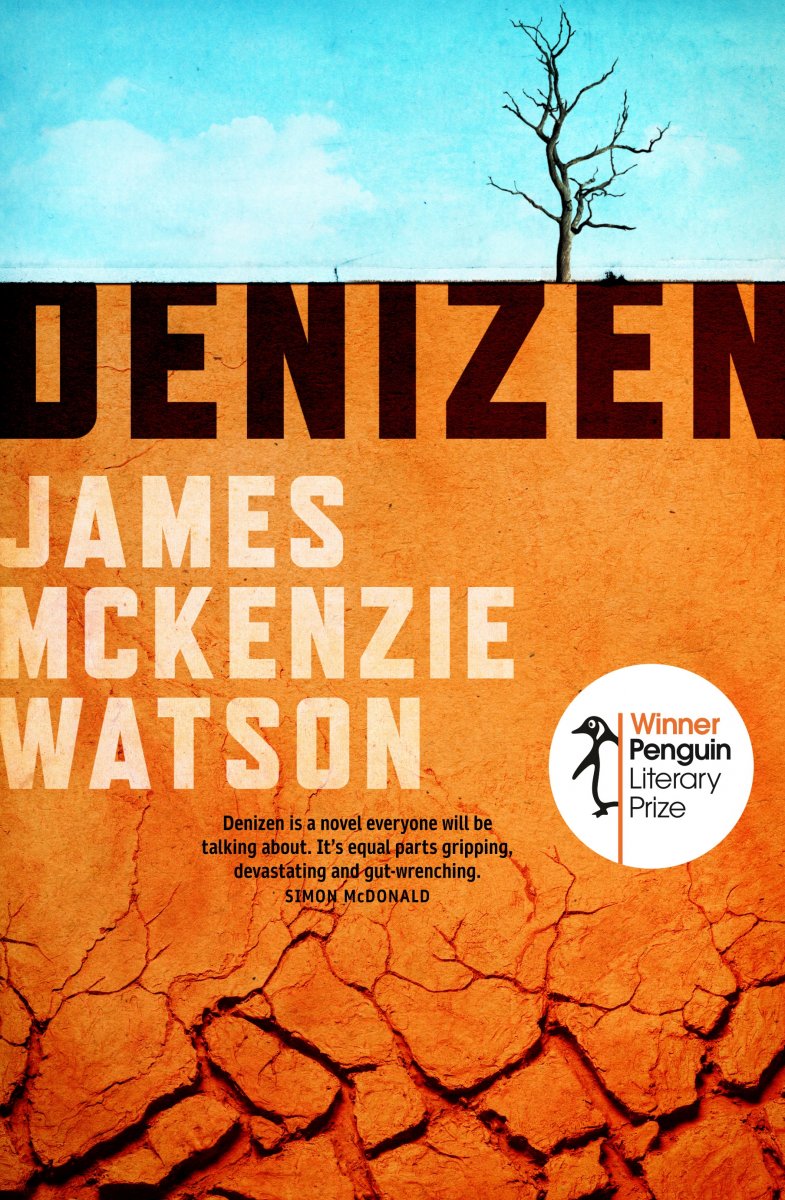
James McKenzie Watson writes fiction with a focus on health and rural Australia. His novel Denizen won the 2021 Penguin Literary Prize and was published by Penguin Random House in 2022. Denizen also received a 2021 Varuna Residential Fellowship and a 2021 KSP Residential Fellowship.
James’ short stories have been recognised in Australian and international competitions. His writing has appeared in Meanjin, Kill Your Darlings and the Newtown Review of Books. James co-hosts the writing and health podcast James and Ashley Stay at Home with author Ashley Kalagian Blunt and works as a nurse in regional New South Wales.
To celebrate the release of his Denizen, James takes on our Ten Terrifying Questions! Read on …
1. To begin with why don’t you tell us a little bit about yourself – where were you born? Raised? Schooled?
I grew up on a little property just outside Coonabarabran, in Central West NSW. I struggled with mental ill-health as a teenager and dropped out of school when I was sixteen. At eighteen, I moved to Sydney, where I found professional support, a network of like-minded people, and opportunities not present in the country. A mentor there suggested I should study nursing as a way to support a creative career, which I already knew I wanted. I’m so glad I took his advice – I’ve now been nursing for eight and a half years. The last two and a half of those years have been back in the country, in Dubbo, NSW. I’m very lucky to have been supported by such kind and wonderful people at every point in my life, my unconditionally loving mum and dad first and foremost.
2. What did you want to be when you were twelve, eighteen and thirty? And why?
At twelve, I wanted to either be a writer or a filmmaker. I knew I loved telling stories; the only question was through what medium. I persevered with filmmaking for a long time, even though when I stuck to writing, my younger brother never got severely hurt. No one was more relieved than he was when I finally gave that up.
At eighteen, I thought I wanted to be a musician. More truthfully, I think I just wanted to stop feeling so unhappy. I would have taken whatever form that came in.
I’ve just turned twenty-nine and am so lucky to be a combination of all the things I wanted when I was younger – a writer, happy, and a nurse to boot. Unless things go really wrong between here and next year, I reckon I’ll be exactly what I want at thirty.
3. What strongly held belief did you have at eighteen that you don’t have now?
That I had life, the world and myself figured out. I suppose it’s not uncommon for an eighteen-year-old to be mistaken about this, but I’m so, so glad to have been wrong.
4. What are three works of art – this could be a book, painting, piece of music, film, etc – that influenced your development as a writer?
First and foremost, David Vann’s 2012 novel Dirt. I was eighteen when I first read it and had no idea that novels like that were even possible. Like all of Vann’s work, it’s a confronting examination of taboo, mental illness and family dysfunction, but it’s the clarity with which he writes that struck me so forcefully. I recognised much of what he described in my own life and internal state. Realising that such intense emotion could be captured on the page was an important step on the path that led to Denizen.
Secondly, one of my all-time favourite movies, the 2004 independent film Mean Creek. In it, a group of primary school kids pull a prank on a class bully which backfires horrifically. It tackles a subject I’ve always been fascinated by – the moral implications for children who commit abhorrent acts – and laid the groundwork for me to explore similar ideas in my own writing.
And finally, the Australian singer/songwriter Montaigne’s 2016 song Come Back to Me. I follow the Ernest Hemingway school of thought when it comes to writing emotion: if you can incrementally describe the stimulus which prompted a feeling, you’ll evoke it more powerfully than if you’d just stated it. In the chorus to Come Back to Me, Montaigne sings (presumably about a break-up): “It’s harder, but you won’t claim me / I would rather throw my heart to sea / I am sad, but I am free / I would love you if you would come back to me.” At first glance, the emotions seem stated baldly, but on closer examination, the true emotion is hidden in the discrepancy between the first three lines and the fourth. It’s this contradiction and the implication that the narrator is lying to themselves that makes the emotion so powerful, despite not being explicitly stated. It really brought home the effectiveness of this technique for me.
5. Considering the many artistic forms out there, what appeals to you about writing a novel?
As a teenager, the thing that convinced me to pursue writing over filmmaking was that writing can be done in isolation – you don’t need anyone’s help to bang out a first draft. With filmmaking, if you’ve run out of Xbox games to bribe your younger brother into acting with, then your production will be delayed indefinitely.
There’s a depth and intimacy to long-form prose that I adore. Novels are substantive chunks of writers’ lives and minds refined into accessible works, capable of evoking incredible emotion, insight and empathy. Also, as Cormac McCarthy once said, “I’m not interested in writing short stories – anything that doesn’t take years of your life and drive you to suicide hardly seems worth doing.”

6. Please tell us about your latest novel!
Denizen is an Australian gothic thriller that explores rural Australia’s simultaneous celebration of harsh country and stoic people – a tension that forces its inhabitants to dangerous breaking points.
On a remote property in western NSW, nine-year-old Parker fears that something is wrong with his brain. His desperate attempts to control this internal chaos spark a series of events that gallop from his control in deadly and devastating ways. Years later, Parker, now a father himself, returns to the bushland he grew up in for a camping trip with old friends. When this reunion descends into chaos amid revelations of unresolved fear, guilt, and violence, Parker must finally address the consequences of his childhood actions.

7. What do you hope people take away with them after reading your work?
Increased empathy for the less Instagrammable manifestations of mental illness, particularly in rural and regional settings. Australian’s made enormous progress in understanding conditions like depression and anxiety in recent years, but there remains a whole submerged iceberg of psychiatric conditions still mired in stigma.
8. Who do you most admire in the writing world and why?
So many people come to mind here, but I think the one I admire most is Ashley Kalagian Blunt. I met Ashley when I joined her writer’s group in 2017. Since then, she’s become my unofficial writing mentor, my podcast co-host, my loudest cheerleader, and one of my best friends. Apart from her brilliant books, the thing I admire most is her ceaseless enthusiasm and generosity among the Australian writing community, particularly toward developing and emerging writers. I wouldn’t be where I am without her support, encouragement, and practical help.
9. Many artists set themselves very ambitious goals. What are yours?
Part of the reason I was so surprised and delighted when Denizen won the 2021 Penguin Literary Prize was because I knew it wasn’t a novel for everyone. I wanted to write about mental illness in the bush without gloss or pretence, which meant inevitably going to confronting and disturbing places. The fact that a publisher as big as Penguin has taken it on gives me incredible hope that the market is ready for more similarly honest stories, even when they’re difficult to hear. So my goal is twofold: one, to continue telling those stories, in whatever form that takes. Two, to help other emerging artists do the same!
10. Do you have any advice for aspiring writers?
Join a writer’s group! Preferably one with strangers in it. Friends and family give wonderful, heart-felt advice, but nothing compares to honest feedback from people actively engaged in the craft of writing. You’ll also learn to critique, see how your work compares to other aspiring writers and meet like-minded people. It’ll be the best thing you ever did as a writer. If you’re not sure how to find one, check out your state’s writer’s centre.
Thank you for playing!
— Denizen by James McKenzie Watson (Penguin Australia) is out now!

Denizen
Winner of the Penguin Literary Prize
A rural thriller from the winner of the 2021 Penguin Literary Prize.
A gothic thriller exploring rural Australia’s simultaneous celebration of harsh country and stoic people – a tension that forces its inhabitants to dangerous breaking points.
On a remote property in western NSW, nine-year-old Parker fears that something is wrong with his brain. His desperate attempts to control this internal chaos spark a series of events that gallop from his control in deadly and devastating ways.
Years later, Parker, now a father himself, returns to the bushland he grew up in for a camping trip with old friends. When this reunion descends into chaos amid revelations of unresolved fear, guilt and violence, Parker must finally address the consequences of his childhood actions.





Comments
No comments